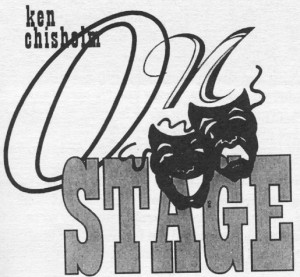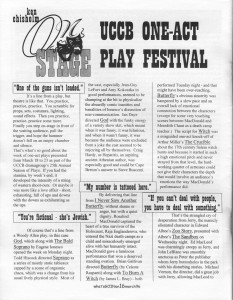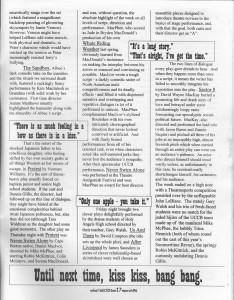 “One of the guns isn’t loaded.”
“One of the guns isn’t loaded.”
It’s a line from a play, but theatre is like that. You practice, practice, practice. You scramble for props sets, costumes, lighting, sound effects. Then you practice some more. Finally you step on stage in front of a waiting audience, pull the trigger, and hope the hammer doesn’t fall on an empty chamber and silence. That’s what’s so good about the week of one-act plays presented from March 18 to 23 as part of the UCCB Dramagroup’s 25th Annual Season of Plays. If you had the stamina, by week’s end, it developed the intensity of a string of western shoot-outs. Or maybe it was more like a love affair – short, exhausting, full of ups and downs with the downs as exhilarating as the ups.
 “You’re fictional – she’s Jewish.”
“You’re fictional – she’s Jewish.”
Of course that’s a line from a Woody Allen play, in this case God which, along with The Bald Soprano by Eugene Ionesco, opened the week on Monday night. Todd Hiscock directed Soprano as a series of mostly static tableaux capped by a scene of orgasmic chaos, which was a change from his usual lively physical style. Most of the cast, especially Jean-Guy LeFort and Amy Kokoszka in good performances, seemed to be champing at the bit to physicalize the absurdly comic inanities and banalities of Ionesco’s dissection of non-communication. Ian Daye directed God with the funky energy of a variety show skit, which meant when it was funny, it was because the audience were excluded from a joke the cast seemed to be enjoying all by themselves. Craig Hardy, as Hepatitis, an aspiring ancient Athenian author, was especially good and could be Cape Breton’s answer to Steve Buscemi.
“My number is tattooed here.”
By delivering that line from I Never Saw Another Butterfly without shame or anger, but with a quiet dignity, Rosalind MacDonald captured the heart of a true survivor of the Holocaust, Raja Englanderova, who entered the Nazi death camps as a child and miraculously emerged alive with her humanity intact. MacDonald gave a luminous performance that won a deserved standing ovation. Brian Gallivan directed Butterfly (by Celeste Raspanti) along with To Burn a Witch (by James L. Bray) – both performed Tuesday night – and that might have been over-reaching. Butterfly’s obvious sincerity was hampered by a slow pace and an overall lack of emotional connection between the characters (except for some very touching scenes between MacDonald and Meredith Chant as a death camp teacher). The script for Witch was a misguided one-act knock-off of Arthur Miller’s The Crucible about the 17th century Salem witch hunts and, because it started in such a high emotional pitch and never strayed from that level, the hard-working quartet of actresses could not involve an audience’s emotions the way MacDonald’s performance did.
“If you can’t deal with people, you have to deal with something.”
That’s a strangled cry of desperation from Jerry, the manically alienated character in Edward Albee’s Zoo Story, presented with Albee’s The Sandbox on Wednesday night. Ed MacLeod was charmingly creepy as Jerry, and John LeBlanc was smoothly unctuous as Peter the publisher whom Jerry button holes in the park with his disturbing stories. Michael Vernon, the director, did a great job with Jerry, allowing MacLeod to neurotically range over the set (which featured a magnificent backdrop painting of glowering skyscrapers by Jamie Vernon). However, Vernon might have helped LeBlanc add some muscle, both physical and dramatic, to Peter’s character which would have ratcheted up the tension as Peter increasingly resisted Jerry’s bullying.
The Sandbox, Albee’s dark comedic take on the inanities and the rituals with which we surround death, featured a cacklingly funny performance by Kim MacIntosh as Grandma (with solid work by her castmates). First time director Jeanne Matthews smartly highlighted the humanity along the absurdity of Albee’s script.
 “There is as much feeling in a bow as there is in a kiss.”
“There is as much feeling in a bow as there is in a kiss.”
That’s the retort of the shocked Japanese father to his rebellious daughter, who, feeling stifled by their own society, grabs at all things Western as her means of escape, in Protest by Norman Williams. It’s the sort of theme-heavy play usually forced on hapless junior and senior high school students. If the cast and Dennis Gillis, the director, had followed up on this line of dialogue, they might have hinted at the emotional complexities behind ritual Japanese politeness, but, alas they did not (although Tara Waldman as the daughter had some good moments). The other play on Thursday night with Protest was Never Swim Alone by Cape Breton native, Daniel MacIvor, directed by Mike McPhee, and starring Robin McIntyre, and Serena MacDonald, and was without question, the absolute highlight of the week on all levels of script, direction and performance. McPhee, who scored as Jude in Bryden MacDonald’s Production of his own Whale Riding Weather last spring, obviously learned from MacDonald’s insistence on making the interplay between his actors as nuanced and convincing as possible. MacIvor wrote a tough script – a darkly comedic satire of North American male competitiveness and its deadly effects – and filled it with disjointed narrative and overlapping and repetitive dialogue (a lot of it performed in unison). McPhee complemented MacIvor’s stylized flourishes with his own intricately choreographed direction that never looked contrived or artificial. And with finely honed performances from all of his talented cast, even when characters acted like self-centered jerks, they never lost the audience’s sympathy. After their spectacular UCCB performance, Never Swim Alone was performed at the Theatre Antigonish Festival and won McPhee an award for best director.
“Only one apple – you take it.”
Friday night brought two clever plays delightfully performed by the drama students of Holy Angels High School directed by their teacher, Gary Walsh. Us And Them by David Compton (the title sets up the whole plot), and After Liverpool by James Saunders (a series of clever relationship-based skirmishes) were well-chosen as ensemble pieces designed to introduce theatre novices to the basics of stage performance and, with that the goal, both casts and their director got an “A”.
“It’s a long story.” “That’s alright, I’ve got time.”
The two lines of dialogue every play-goer dreads to hear. And when they happen more than once in a script, it means the writer has failed to smoothly integrate his exposition into the play. Sector 8 by David Wayne MacKay buried a promising life and death story of love and betrayal under some exhilaratingly loopy rants forecasting our apocalyptic social-political future. MacKay also directed and performed the lead role (with Jason Baron and Zannie Saquin) and pitched all three of his jobs at an impossibly high, almost feverish pitch which, when carried through an entire play, can wear out an audience’s patience. An actor who directs himself should tread warily unless, as unfortunately in this case, he unintentionally shortchanges himself, his castmates, and his audience.
The week ended on a high note with a Theatresports competition presided over by the unflappable John LeBlanc. The stately Gary Walsh and his trio of fresh-faced students were no match for the jaded hijinx of the maniacal Mike McPhee, the bubbly Trina Hennick (both of whom round out the cast of this year’s Summertime Revue), the springy Robin McKittrick and the curiously undulating Dennis Gillis.
“Until next time, kiss kiss, bang bang.”

